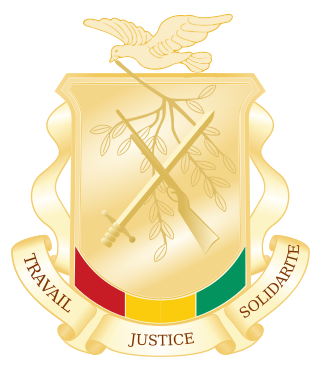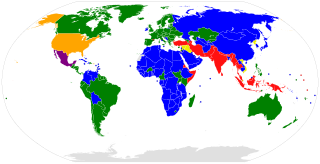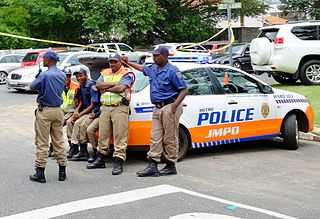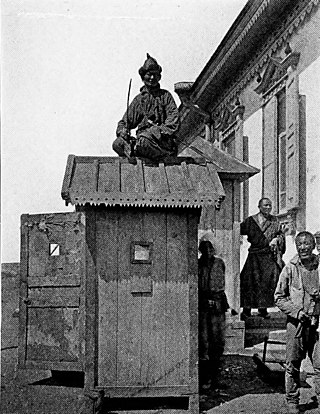Related Research Articles

The Guinean Armed Forces are the armed forces of Guinea. They are responsible for the territorial security of Guinea's border and the defence of the country against external attack and aggression.

A militia is generally an army or some other fighting organization of non-professional and/or part-time soldiers; citizens of a country, or subjects of a state, who may perform military service during a time of need, as opposed to a professional force of regular, full-time military personnel; or, historically, to members of a warrior-nobility class. When acting independently militias are generally unable to hold ground against regular forces; militias commonly support regular troops by skirmishing, holding fortifications, or conducting irregular warfare, instead of undertaking offensive campaigns by themselves. Local civilian laws often limit militias to serve only in their home region, and to serve only for a limited time; this further reduces their use in long military campaigns. Militias may also, however, serve as a pool of available manpower for regular forces to draw from, particularly in emergencies.
Article 9 of the Japanese Constitution is a clause in the Constitution of Japan outlawing war as a means to settle international disputes involving the state. The Constitution came into effect on 3 May 1947, following the surrender of Japan in World War II. In its text, the state formally renounces the sovereign right of belligerency and aims at an international peace based on justice and order. The article also states that, to accomplish these aims, armed forces with war potential will not be maintained. The Constitution was imposed by the occupying United States in the post–World War II period.

The Posse Comitatus Act is a United States federal law signed on June 18, 1878, by President Rutherford B. Hayes which limits the powers of the federal government in the use of federal military personnel to enforce domestic policies within the United States. Congress passed the Act as an amendment to an army appropriation bill following the end of Reconstruction and updated it in 1956, 1981 and 2021.

The Geneva Convention relative to the Protection of Civilian Persons in Time of War, more commonly referred to as the Fourth Geneva Convention and abbreviated as GCIV, is one of the four treaties of the Geneva Conventions. It was adopted in August 1949, and came into force in October 1950. While the first three conventions dealt with combatants, the Fourth Geneva Convention was the first to deal with humanitarian protections for civilians in a war zone. There are currently 196 countries party to the 1949 Geneva Conventions, including this and the other three treaties.

A paramilitary is an organization whose structure, tactics, training, subculture, and (often) function are similar to those of a professional military, but which is not part of a country's official or legitimate armed forces. Paramilitary units carry out duties that a country's military or police forces are unable or unwilling to handle. Other organizations may be considered paramilitaries by structure alone, despite being unarmed or lacking a combat role.

A commander in chief or supreme commander is the person who exercises supreme command and control over an armed force or a military branch. As a technical term, it refers to military competencies that reside in a country's executive leadership, a head of state, head of government, or other designated government official.
Demilitarisation or demilitarization may mean the reduction of state armed forces; it is the opposite of militarisation in many respects. For instance, the demilitarisation of Northern Ireland entailed the reduction of British security and military apparatuses. Demilitarisation in this sense is usually the result of a peace treaty ending a war or a major conflict. The principle is distinguished from demobilisation, which refers to the drastic voluntary reduction in the size of a victorious army.
Militarization, or militarisation, is the process by which a society organizes itself for military conflict and violence. It is related to militarism, which is an ideology that reflects the level of militarization of a state. The process of militarization involves many interrelated aspects that encompass all levels of society.

The Patriotic Guards were Romanian paramilitary formations formed during the Communist era, designed to provide additional defence in case of a foreign attack.

The militia of the United States, as defined by the U.S. Congress, has changed over time. During colonial America, all able-bodied men of a certain age range were members of the militia, depending on each colony's rule. Individual towns formed local independent militias for their own defense. The year before the U.S. Constitution was ratified, The Federalist Papers detailed the Founding Fathers' paramount vision of the militia in 1787. The new Constitution empowered Congress to "organize, arm, and discipline" this national military force, leaving significant control in the hands of each state government.

Law enforcement in South Africa is primarily the responsibility of the South African Police Service (SAPS), South Africa's national police force. SAPS is responsible for investigating crime and security throughout the country. The "national police force is crucial for the safety of South Africa's citizens" and was established in accordance with the provisions of Section 205 of the Constitution of South Africa.
Presser v. Illinois, 116 U.S. 252 (1886), was a landmark decision of the Supreme Court of the United States that held, "Unless restrained by their own constitutions, state legislatures may enact statutes to control and regulate all organizations, drilling, and parading of military bodies and associations except those which are authorized by the militia laws of the United States." It states that the Second Amendment to the United States Constitution limited only the power of Congress and the national government to control firearms, not that of the states, and that the right to peaceably assemble in the First Amendment to the United States Constitution was not protected by the clause referred to except to petition the government for a redress of grievances. This decision was overruled in McDonald v. City of Chicago in (2010).
The paramilitary forces of China are the military units and formations apart from the People's Liberation Army, the principal military force of the People's Republic of China. They are composed of three main forces, the People's Liberation Army reserve force, the People's Armed Police (PAP), and the Militia, and they act as auxiliaries to the active forces of the People's Liberation Army. They generally perform a wide range of roles. All together, the paramilitary has 98,854,000 troops, as of 2018.

Red Guards were paramilitary volunteer formations consisting mainly of factory workers, peasants, cossacks and partially of soldiers and sailors for "protection of the soviet power". Red Guards were a transitional military force of the collapsing Imperial Russian Army and the base formations of Bolsheviks during the October Revolution and the first months of the Russian Civil War. Most of them were formed in the time frame of the Russian Revolution of 1917, and some of the units were reorganized into the Red Army during 1918. The Red Guards formations were organized across most of the former Russian Empire, including territories outside the contemporary Russian Federation such as Finland, Poland, Estonia, Ukraine, and others. They were not centralized and were formed by decision of a local political party and local soviet members. By fighting to protect and extend the power of the Soviets, they aided the creation of a new state that would give "all power to the soviets": the Soviet Union.
Military use of schools is a term used to refer to the various activities that national armed forces and non-state armed groups carry out in and around schools, universities, and other education facilities, in support of their military effort. Examples of this include using a school or a university as barracks or bases, for offensive or defensive deployments, for storage of weapons or ammunition, for military training of soldiers, as observation posts, and as a detention facility.
In the United States, the right to keep and bear arms is a fundamental right protected by the Second Amendment to the United States Constitution, part of the Bill of Rights, and by the constitutions of most U.S. states. The Second Amendment declares:
A well regulated Militia, being necessary to the security of a free State, the right of the people to keep and bear Arms, shall not be infringed.

The Popular Mobilization Forces (PMF) or Al-Hashd al-Shaabi, also known as the People's Mobilization Committee (PMC) and the Popular Mobilization Units (PMU), is an Iraqi state-sponsored umbrella organization composed of approximately 67 different armed factions, with around 230,000 fighters that are mostly Shia Muslim groups, but also include Sunni Muslim, Christian, and Yazidi groups. The Popular Mobilization Units as a group was formed in 2014 and have fought in nearly every major battle against ISIL. Many of its main militias, in particular the Shias, trace their origins to the "Special Groups", Iranian-sponsored Shi'ite groups which previously fought an insurgency against the United States and the Coalition forces, as well as a sectarian conflict against Sunni Jihadist and Ba'athist insurgents. It has been called the new Iraqi Republican Guard after it was fully reorganized in early 2018 by its then–Commander in Chief Haider al-Abadi, Prime Minister of Iraq from 2014 to 2018, who issued "regulations to adapt the situation of the Popular Mobilization fighters".

The Ministry of Justice and Home Affairs is the sole organ of national security in Mongolia. The primary force is responsible for maintaining law and order and preventing crime throughout the country is the National Police Agency, created in 1965 and headquartered in the capital Ulaanbaatar. Interpol has an office within the Mongolian Police.

The Militia or Militia of China is the militia part of the armed forces of China, other two parts being the People's Liberation Army (PLA) and the People's Armed Police (PAP). The Militia is under the leadership of the Chinese Communist Party (CCP) and serves as an auxiliary and reserve force for the PLA. It is one of the largest militias in the world.
References
- ↑ "Constitution of Angola". Constitute Project. Retrieved 14 August 2022.
- ↑ "Constitution of Brazil". Constitute Project. Retrieved 14 August 2022.
- ↑ "Constitution of Bulgaria". Constitute Project. Retrieved 14 August 2022.
- ↑ "Constitution of Cape Verde". Constitute Project. Retrieved 14 August 2022.
- ↑ "Constitution of Comoros". Constitute Project. Retrieved 14 August 2022.
- ↑ "Constitution of Congo". Constitute Project. Retrieved 14 August 2022.
- ↑ "Constitution of Gabon". Constitute Project. Retrieved 14 August 2022.
- ↑ "Constitution of Guinea Bissau". Constitute Project. Retrieved 14 August 2022.
- ↑ "Constitution of Iraq". Constitute Project. Retrieved 14 August 2022.
- ↑ "Constitution of Kazakhstan". Constitute Project. Retrieved 14 August 2022.
- ↑ "Constitution of Kenya". Constitute Project. Retrieved 14 August 2022.
- ↑ "Constitution of Mozambique". Constitute Project. Retrieved 14 August 2022.
- ↑ "Constitution of North Macedonia". Constitute Project. Retrieved 14 August 2022.
- ↑ "Constitution of Oman". Constitute Project. Retrieved 14 August 2022.
- ↑ "Constitution of Paraguay". Constitute Project. Retrieved 14 August 2022.
- ↑ "Constitution of Philippines". Constitute Project. Retrieved 14 August 2022.
- ↑ "Constitution of Portugal". Constitute Project. Retrieved 14 August 2022.
- ↑ "Constitution of Romania". Constitute Project. Retrieved 14 August 2022.
- ↑ "Constitution of Serbia". Constitute Project. Retrieved 14 August 2022.
- ↑ "Constitution of South Sudan". Constitute Project. Retrieved 14 August 2022.
- ↑ "Constitution of Spain". Constitute Project. Retrieved 14 August 2022.
- ↑ "Constitution of East Timor". Constitute Project. Retrieved 14 August 2022.
- ↑ "Constitution of Ukraine". Constitute Project. Retrieved 14 August 2022.
- ↑ "Constitution of Yemen". Constitute Project. Retrieved 14 August 2022.